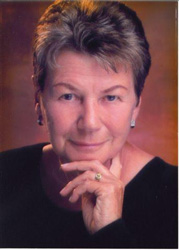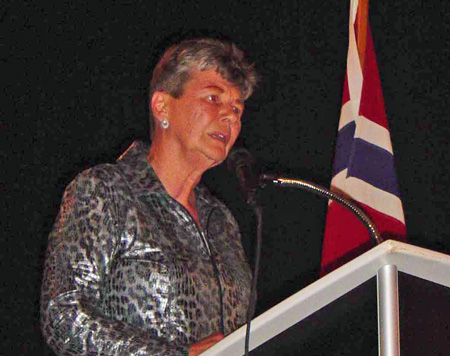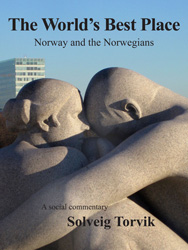If you’ve heard of the Seattle Freeze, then a quote near the start of Solveig Torvik’s new book, “The World’s Best Place: Norway and the Norwegians,” might sound familiar. “A Norwegian will not talk to you without good reason,” states a cross-cultural communications expert. “And saying hello is not a good enough reason.”
 This perhaps can be forgiven when you consider Norwegians’ generosity; they are often the first to contribute to victims of natural disasters around the world and pitch in more per-capita than virtually anyone else. And that charity begins at home. With its enviable longevity rates, its cradle-to-grave health care, its free education – not to mention its stupendous natural beauty and millions in annual revenue from North Sea oilfields – Norway is routinely named by the U.N. and other entities as the best place to live.
This perhaps can be forgiven when you consider Norwegians’ generosity; they are often the first to contribute to victims of natural disasters around the world and pitch in more per-capita than virtually anyone else. And that charity begins at home. With its enviable longevity rates, its cradle-to-grave health care, its free education – not to mention its stupendous natural beauty and millions in annual revenue from North Sea oilfields – Norway is routinely named by the U.N. and other entities as the best place to live.
Torvik discussed her book, which delves beneath the surface of this seeming utopia, on Tuesday evening at the Nordic Heritage Museum. An enthusiastic audience of around 65 included many transplanted Scandinavians. A former longtime Ballard resident and journalist – she retired as associate editorial-page editor of the Seattle Post-Intelligencer – Torvik now lives in Central Washington. Her first decade of life, however — the 1940s — was spent in the picturesque fjord village of Aalesund, where she was “imprinted with Norway’s values and sensibilities,” she said. Her family then immigrated to Salt Lake City.

Speaking from a lectern on a stage, Torvik wore a shiny fitted animal-print jacket and black pants for the occasion. “Norwegians don’t like to spend money, take risks or discuss unpleasant topics,” she said. “They are modest, fiercely egalitarian, they despise the rich and they won’t speak to strangers.” This egalitarianism can be credited with driving the country’s social welfare experiment that “aims to provide life’s necessities to every citizen.”
On the one hand, given Norway’s history, this accomplishment is astounding. The country entered the 20th century in “grinding poverty,” Torvik said, and remained so for decades. A cousin of mine, in fact, tells of helping her mother wash clothes in the nearby river in Oppdal as late as 1960. On the other hand, Torvik worries about what has been given up in order to maintain this standard of living. How far should government go to provide for welfare, she asks, and what happens to individual initiative and personal responsibility? Despite the fact that Norway has just 4.8 million people, Torvik believes Americans can learn from its experiences.
 “The World’s Best Place” is chock-full of facts and engaging anecdotes, ranging from a wimpy police response to pickpockets in Oslo, to the country’s proclivity toward binge drinking on the weekends (one chapter is entitled “Drunk and Disorderly”), to a Muslim group’s desire to purchase a hearse. The latter were confounded to learn that it would need to feature a Christian cross; naturally, they preferred a crescent moon. But the officials they appealed to were equally confounded — why would they not want a cross?
“The World’s Best Place” is chock-full of facts and engaging anecdotes, ranging from a wimpy police response to pickpockets in Oslo, to the country’s proclivity toward binge drinking on the weekends (one chapter is entitled “Drunk and Disorderly”), to a Muslim group’s desire to purchase a hearse. The latter were confounded to learn that it would need to feature a Christian cross; naturally, they preferred a crescent moon. But the officials they appealed to were equally confounded — why would they not want a cross?
In Oslo, 25 percent of residents are immigrants; of those, 80 percent are people of color, Torvik said. Immigrants began arriving several decades ago from Somalia, Pakistan and other nations. For Norwegians, absorbing people who are quite different from themselves into society is a challenge.
“Norwegians used to be quick to criticize Americans for their shoddy treatment of blacks,” Torvik said. “Now that Norway struggles with its own racial minorities, they are silent.” Charges of racism tend to fall on deaf ears. Equal-opportunity programs have never existed; Norwegians see them as potentially playing favorites and detracting from the culture’s focus on society as a whole vs. the individual.
The country’s work ethic is another area that has changed radically. “Norwegians used to be known as hardy, tireless workers,” Torvik said. Today however, she noted that on average, when weekends are counted, Norwegians with full-time jobs work only half the year. “Yet commonly they say they are stressed at work,” she added, and there is a 25 percent absentee rate from work.
Also, it is “astonishingly easy to go on disability,” she said. Half the work force is employed by the government, and the unemployment rate has grown from 2.4 percent to 3.6 percent over the past two years, according to the website Trading Economics.
“When Norwegians agreed to tax themselves, everyone agreed to put something in so everyone could take something out,” she said. “Now many able-bodied Norwegians refuse to put anything in. Will the glue hold that cements Norway’s social and welfare compact?”
This, of course, is a question for those running the country – the members of Parliament or the Storting. As a former political reporter, Torvik said she is probably most concerned about Norway’s system of government and its lack of transparency and accountability to voters.
“They have no elected representatives; lawmakers have no constituents and offer no constituent services,” she said. Norwegians do not vote for the person, but rather, the party; “that way, they cannot be held individually accountable.” Compared with their American counterparts they are very far removed from voters; “they might as well be governing on the moon.
“This accountability deficit … serves to disenfranchise citizens,” she said.
The news media, as well, apparently do not see themselves as watchdogs of government. In fact, in some cases information is “filtered beforehand by the subjects of news stories themselves,” Torvik said. “Government ministers ask to see quotes before publication, and Norway’s leading newspapers agree to this. … This highhanded behavior by Norway’s political class suggests a contempt for the role of the press in a free society and for the citizenry.”
Ultimately though, despite Norway’s problems, Torvik believes her homeland has fashioned a remarkable society. “The nation’s core organizing principle, concern for the common good, is the gold standard to which any enlightened society should aspire,” she writes in the book’s afterword. “In Norway as in the U.S., the ongoing challenge is to strike the elusive balance between too much government protection of citizens and not enough. In the U.S., we typically opt for too little. Norway, in my view, has opted for too much.
“The good news is that, thanks to its wealth and the fundamental intelligence of its people, Norway is uniquely positioned to remedy many of these flaws and to set the bar even higher for countries that aspire to be recognized as the world’s best place to live.”
“The World’s Best Place” is available for purchase as an e-book; for information click here.
Here is an interview with Torvik from TVW’s “Author’s Hour” last June.
(Contributor Karen Rathe lives in Ballard and teaches journalism with the University of Washington Department of Communication. Exploring her Norwegian roots is one of her greatest passions.)

Norway is a lazy socialist country that has virtually no chance of survival in the world economy.
More than half of the workers are employed by the government? The only percentage higher than that is their tax rate! What a recipe for success.
Also they hate minorities and have a completely naive world view, as evidenced by giving Obama the peace prize.
Nice knowing you, Norway.
What an ugly book cover!
and author
and author
I like the cover!
‘Her first decade of life, however — the 1940s — was spent in the picturesque fjord village of Aalesund, where she was “imprinted with Norway’s values and sensibilities,” she said. Her family then immigrated to Salt Lake City.’
I am so, so sorry to read of her tragedy. I moved to Utah at about the same age. It’s beautiful that she has managed to move on and write about this horrifying experience.
This is excellent information, Kathy.
Please provide the full list of countries and institutions that you feel this way about, so that I can invest in them heavily.
I know!
With an unemployment rate that recently rose to 3.6%, the highest Human Development Index in the world, nearly highest GDP per capita, average life expectancy of 80 years, and universal education and health care, they sure are going to hell in a hand basket! No wonder those wonks over at Foreign Policy Magazine rated Norway dead last in its 2009 Failed States Index, making it the most well-functioning and stable economy in the world and 20 countries ahead of the USA.
Clearly those lazy socialists don’t know what they’re doing! Either that, or perhaps someone here does have a completely naive worldview.
Yes Norway has problems, but RTFA. “Norway is uniquely positioned to remedy many of these flaws and to set the bar even higher for countries that aspire to be recognized as the world’s best place to live.”
I believe the cover is from the Vigelund sculpture garden in Oslo. I agree with you about that particular picture — I love the sculpture, but I don’t think the pic is very good photography — but the sculpture garden as a whole is marvelous.
uh, let’s make you “Kathy in somewhere other than Ballard”
I think it’s just the font.
“A Norwegian will not talk to you without good reason,” states a cross-cultural communications expert. “And saying hello is not a good enough reason.”
At least they admit they are a stern, cold social drag.
I’m trying to figure out what her “shiny fitted animal-print jacket and black pants” has to do with the fact that “Norwegians don’t like to spend money, take risks or discuss unpleasant topics”. Can anyone help me bridge the illustration with the quote? Anyone?
LOL — a valid call! My goal was to set the scene with a bit of description, and that quote seemed to quickly summarize the disparate variances of the Norwegian psyche; I realized too late the odd juxtaposition. Let me assure you that Solveig’s attire was very classy; I doubt she scrimped on it …
Also, just to say, Norwegians do like to spend money. They just don’t like to show-off about it. Much of the money is spent on the home, or renovations/furniture/decorations inside of the home.
The country is not socialist (there is a difference between socialism and a social democracy) and let’s face it, there needs to be some benefits for surviving that far north.
I feel uncomfortable that we (Norway) are subjected to this type of discussion. We are a small country in northern Norway. We happen to have a good standard of living, but so do all the Scandinavian countries. At the same time we have our share of problems like everywhere else. There is nothing heavenly or divine about the country. I think our countries must have a comfortable standard of living, because otherwise it would be too much trouble to live in such cold climates. So, if anyone want to find faults with our country, they will.
PS! Also, she is wrong about Oslo dialect is the dialect of the elite. Oslo is the capital city and the most populous – so naturally the most common dialect. There is a strong culture in Norway of speaking the accent from where you were born. Therefore, the elite will speak the accent from where they were born – be it Oslo, Bergen, Molde or Sogn.
I feel uncomfortable that we (Norway) are subjected to this type of discussion. We are a small country in northern Norway. We happen to have a good standard of living, but so do all the Scandinavian countries. At the same time we have our share of problems like everywhere else. There is nothing heavenly or divine about the country. I think our countries must have a comfortable standard of living, because otherwise it would be too much trouble to live in such cold climates. So, if anyone want to find faults with our country, they will.
PS! Also, she is wrong about Oslo dialect is the dialect of the elite. Oslo is the capital city and the most populous – so naturally the most common dialect. There is a strong culture in Norway of speaking the accent from where you were born. Therefore, the elite will speak the accent from where they were born – be it Oslo, Bergen, Molde or Sogn.
Another comment in response to the video interview (linked in the article). The author has many interesting insights, but I would heavily disagree with her analysis of Norway’s reluctance to join the EU. There is much agreement among academics that the decision is heavily influenced by fisheries and energy policies that Norway does not wish to be subject to (there are opt-outs in the EEA legislation) and a strong streak of national independence after gaining it from Sweden in 1905. Not necessarily “xenophobia”.
Another comment in response to the video interview (linked in the article). The author has many interesting insights, but I would heavily disagree with her analysis of Norway’s reluctance to join the EU. There is much agreement among academics that the decision is heavily influenced by fisheries and energy policies that Norway does not wish to be subject to (there are opt-outs in the EEA legislation) and a strong streak of national independence after gaining it from Sweden in 1905. Not necessarily “xenophobia”.
sorry, I dont know how to edit my own post…should be small country in Northern Europe…..
At $9 for a beer, not many red-neck will be moving there!
“Norwegians don’t like to spend money, take risks or discuss unpleasant topics,” she said. “They are modest, fiercely egalitarian, they despise the rich and they won’t speak to strangers.”
While it is funny to read such simple characterization of a whole population, the reality is of course quite different. “Won’t speak to strangers?” I hope not the whole book is based on such stereotypes…
Nice to know that they hate minorities enough to give one the Nobel Peace Prize. Wait…what?
Interestingly enough, modern Norway has existed since the end of WWII; had it not been for the Allies they’d have been speaking German now, since they lacked the capacity or the will to protect themselves from Hitler’s Germany. Norway had no indigenous population, i.e., “Indians” and never held slaves; their borders are not overrun with illegal immigrants from a neighboring country, such as Mexico, nor are they overrun from the North by legal Socialists (Canada); their current defense is provided by NATO (read that as U.S., U.K. and Germany)…so all in all their existence seems to be comparable to an over-educated, undermotivated, 30 year-old, living his extended adolescence on the couch of his parents’ home, while eating from their refrigerator and driving their cars. Talk to me about the “utopia” of Norway 250 years from their latest Genesis…
Really? Were you conscious when you wrote this? Was it that difficult to check Wiki?
– Norway’s merchant fleet provided a little less than 2/3rds of all shipping (total bulk – including the troops, the equipment, the food and medical supplies) across the Atlantic during the 2nd World War. That’s 2/3rds. In other words: No Norwegian ships – no D-Day.
– Norway has an indigenous population – they are called the Sami – and have lived in Northern Norway for thousands of years. They are also the first indigenous group in the world to have their own parliament which directly works with the national parliament (of Norway)
– Norway is a founding member of NATO – and Norway provides its own defence.
– Norway became a de jure modern nation-state, with control over its own foreign policy being finally achieved, in 1905 – the year the union with Sweden was dissolved.
– But Norway’s constitution dates from 1814 – considered one of the most radical at its time (in terms of democratic and liberal influences), second only to that of the……….. United States.
Kathy, Kathy, Kathy…
I disagree with what she said about the EU. The main reason isnt’ ‘xenophobia’. And most are aware that we pay a lot of money to the EU (because of the EEA). The EU question is rather complicated. Norway would not have a lot of power if we joined anyway. We have little to gain. And Oslo is not the dialect of the elite. You speak with whatever dialect you have. Oslo is the capital, so of course a lot of rich people etc live there.